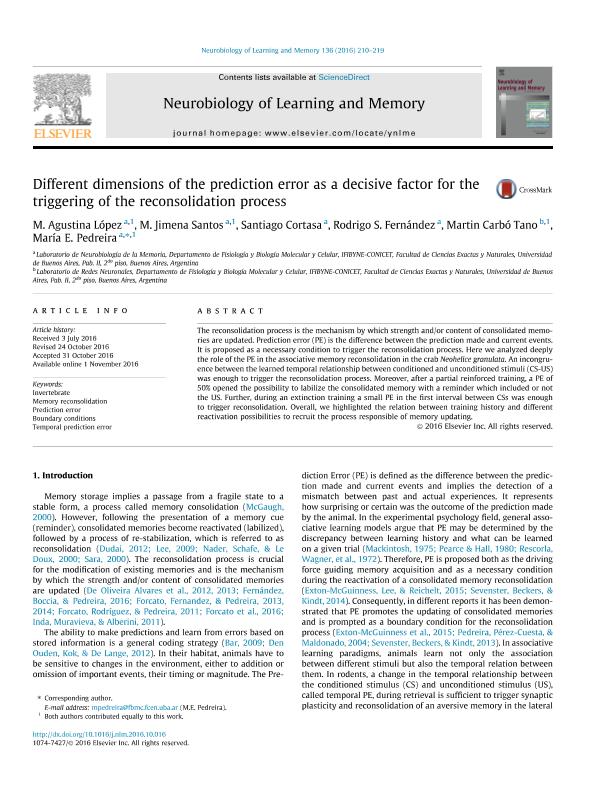Artículo
Different dimensions of the prediction error as a decisive factor for the triggering of the reconsolidation process
López, M. Agustina; Santos, María Jimena ; Cortasa, Santiago Andrés
; Cortasa, Santiago Andrés ; Fernández, Rodrigo Sebastián
; Fernández, Rodrigo Sebastián ; Carbo, Martin
; Carbo, Martin ; Pedreira, Maria Eugenia
; Pedreira, Maria Eugenia
 ; Cortasa, Santiago Andrés
; Cortasa, Santiago Andrés ; Fernández, Rodrigo Sebastián
; Fernández, Rodrigo Sebastián ; Carbo, Martin
; Carbo, Martin ; Pedreira, Maria Eugenia
; Pedreira, Maria Eugenia
Fecha de publicación:
12/2016
Editorial:
Academic Press Inc Elsevier Science
Revista:
Neurobiology of Learning and Memory
ISSN:
1074-7427
Idioma:
Inglés
Tipo de recurso:
Artículo publicado
Clasificación temática:
Resumen
The reconsolidation process is the mechanism by which strength and/or content of consolidated memories are updated. Prediction error (PE) is the difference between the prediction made and current events. It is proposed as a necessary condition to trigger the reconsolidation process. Here we analyzed deeply the role of the PE in the associative memory reconsolidation in the crab Neohelice granulata. An incongruence between the learned temporal relationship between conditioned and unconditioned stimuli (CS-US) was enough to trigger the reconsolidation process. Moreover, after a partial reinforced training, a PE of 50% opened the possibility to labilize the consolidated memory with a reminder which included or not the US. Further, during an extinction training a small PE in the first interval between CSs was enough to trigger reconsolidation. Overall, we highlighted the relation between training history and different reactivation possibilities to recruit the process responsible of memory updating.
Archivos asociados
Licencia
Identificadores
Colecciones
Articulos(IFIBYNE)
Articulos de INST.DE FISIOL., BIOL.MOLECULAR Y NEUROCIENCIAS
Articulos de INST.DE FISIOL., BIOL.MOLECULAR Y NEUROCIENCIAS
Articulos(SEDE CENTRAL)
Articulos de SEDE CENTRAL
Articulos de SEDE CENTRAL
Citación
López, M. Agustina; Santos, María Jimena; Cortasa, Santiago Andrés; Fernández, Rodrigo Sebastián; Carbo, Martin; et al.; Different dimensions of the prediction error as a decisive factor for the triggering of the reconsolidation process; Academic Press Inc Elsevier Science; Neurobiology of Learning and Memory; 136; 12-2016; 210-219
Compartir
Altmétricas



